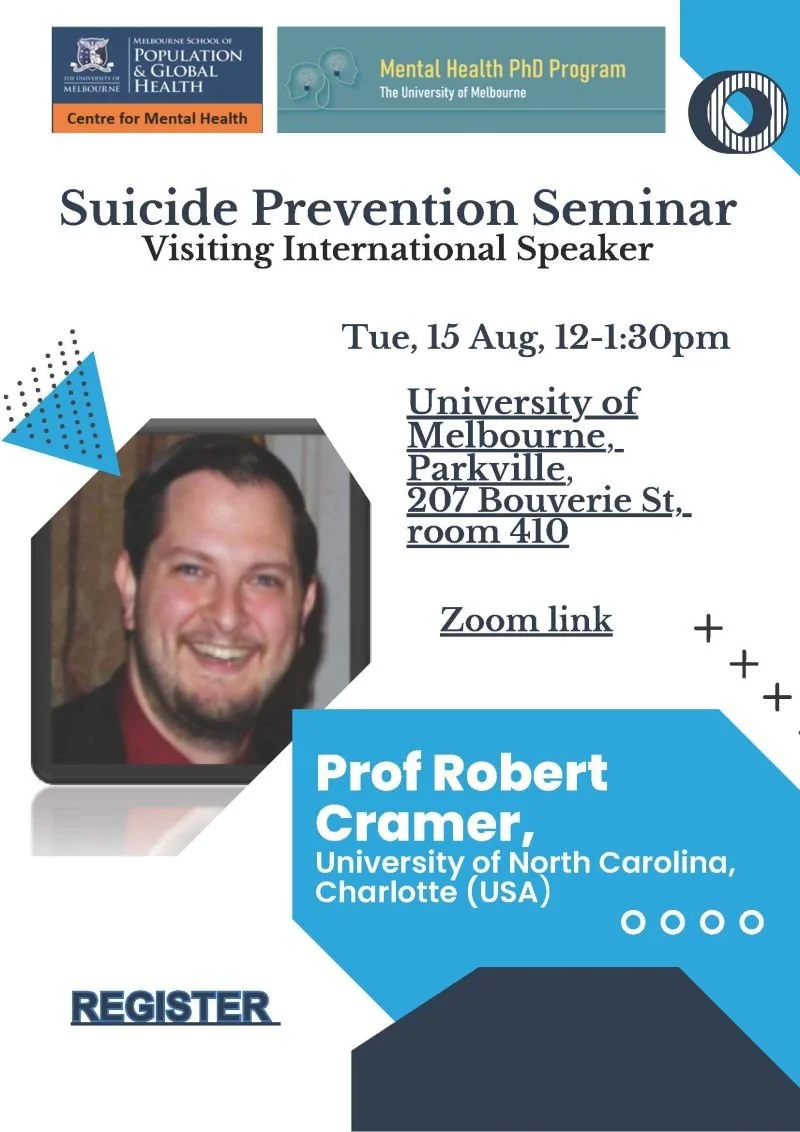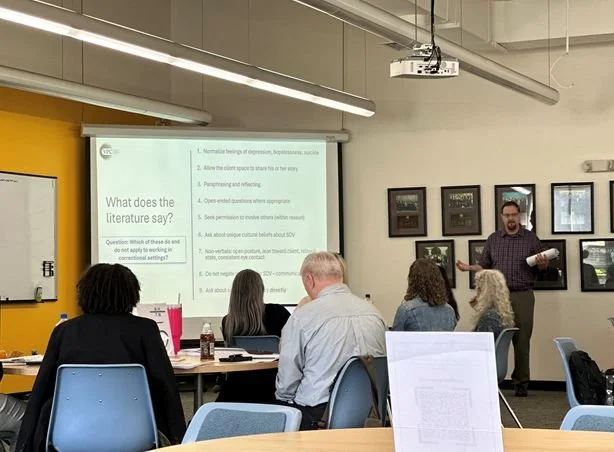Dr. Cramer provides training for healthcare, educational, legal, and other professionals worldwide. These are representative training programs. If you are interested in discussing a training request with Dr. Cramer, please reach out via the contact form.
College Campus Suicide Prevention
Operating on the belief that campus suicide prevention and mental health promotion is everyone’s business, the College Campus Suicide Prevention training program applies the Social-Ecological Model of Suicide Prevention (Cramer & Kapusta, 2017) to a university setting. The training addresses the following subjects:
1. Guidelines and a case illustration (Cramer et al., 2022) of designing a comprehensive, social-ecologically based campus suicide prevention program
2. Sample programs and interventions across levels of the social-ecological model
3. Considerations for high-risk student groups
4. Review of campus policies and strategic planning
The training concludes with a discussion of lessons learned and beginning efforts to develop a plan for any local campus community.
Military Suicide Stigma: Concepts, Measurement, & Solutions
Stigmatizing beliefs about suicide can be focused on oneself or other persons (Cacace et al., 2025; Cramer et al., 2022). Such stigma exacerbates suicide risk and limits help-seeking, especially among military active duty service members. This training addresses military suicide stigma from a public health perspective in order to identify strategies to assess and reduce the problem. The Military Suicide Stigma training program covers:
1. Definitions of self-stigma, public stigma, and military suicide stigma
2. Stigma measurement tool uses and limitations
3. Patterns and impacts of stigma in the military
4. Options for stigma reduction interventions
Dr. Cramer gave trainings and lectures during his 2023 visit to the Griffith University Australian Institute for Suicide Research and Prevention.Core Competency Model (CCM) Suicide Prevention Training
The CCM (Cramer et al., 2013, 2024) provides training for mental health providers in basic-to-intermediate skills. Based on a social-cognitive training approach, the CCM addresses 10 clinical care and clinician self-management skills:
1. Managing your attitudes and reactions toward suicide-related topics
2. Maintaining a collaborative, empathetic stance toward the client
3. Assessing evidence-based, culturally-informed risk and protective factors
4. Eliciting details of current plan and intent of suicidal ideation
5. Developing a therapeutic and tailored risk formulation
6. Enacting a collaborative evidence-based treatment plan
7. Involving supportive other persons
8. Documenting formulation, plan, and reasoning for clinical decisions
9. Knowing the law concerning suicide
10. Engaging in debriefing and self-care
Training includes psycho-educational, interactive scenarios, and resources for mental health providers. It is also accompanied by the Suicide Competency Assessment Form-Revised (Cramer et al., 2024), a self- and/or observer-rated tool for use in clinical supervision, self-reflective practices, and training evaluation. Training in these essential skills sets the provider up to move to advanced risk management and therapeutic interventions.
Testifying in Court: A Workshop for Expert Witnesses
Professionals from many disciplines and backgrounds can be credentialed as an expert witness. Testifying in court, however, can be a challenging and daunting task for professionals regardless of experience level. This training applies models of witness credibility (Brodsky et al., 2010) and testimony delivery skills (Cramer et al., 2010) to address the following topics:
1. An introduction to the testifying process
2. Qualifications and processes for the expert witness
3. What makes a credible witness
4. Effective verbal and non-verbal testimony delivery skills
5. Sample strategies to handle cross-examination.
Dr. Cramer partnered with Drs. Jon Peiper and Marvella Bowman to deliver summer 2025 Core Competency Model for Corrections (CCM-C) master trainer sessions for the NC Department of Adult Correction.Hate-Motivated Behavior: Evidence, Impacts, & Solutions
Hate-motivated behavior covers criminal and non-criminal acts motivated by perceived or actual identity of the victimized person or group. Experiences of such acts can impact health and psychosocial well-being. Policy, educational, criminal-legal and other solutions have been field tested, with little success to dates. Grounded in the Social-Ecological Model of Hate-Motivated Behavior (Cramer et al., 2020), this training is appropriate for legal, law enforcement, victim advocate, public health, and other professionals involved in violence prevention. This training covers:
1. Definitions of hate-motivated behavior.
2. The Social-Ecological Model of Hate-Motivated Behavior
3. The psychological and social roots of hate-motivated behavior.
4. Negative impacts on victimized individuals and communities.
5. Prevention response skills, solutions, and evidence.This is a frequently asked question?
It all begins with an idea. Maybe you want to launch a business. Maybe you want to turn a hobby into something more. Or maybe you have a creative project to share with the world. Whatever it is, the way you tell your story online can make all the difference.
Core Competency Model-Corrections (CCM-C) Suicide Prevention Training
The CCM-C (Cramer, Kaniuka, & Peiper, 2022; Peiper et al., 2024) program is an adapted version of the original Core Competency Model (CCM), tailored for considerations of carceral populations and settings. Adopting the Centers for Disease Control Self-Directed Violence (SDV) framework, the CCM-C program provides training in correctional suicide and self-injury prevention skills for mental health providers. The program covers the following essential skills:
1. Managing your attitude and reactions toward self-directed violence
2. Maintaining a collaborative, empathetic stance toward the client
3. Knowing and eliciting evidence-based risk and protective factors
4. Focusing on current plan and intent of self-directed violence
5. Determining level of risk
6. Developing and enacting a collaborative evidence-based treatment plan
7. Notifying and involving other persons
8. Documenting risk, plan, and reasoning for clinical decisions
9. Knowing the law concerning self-directed violence
10. Engaging in debriefing and self-care
CCM-C training provides psycho-educational content, clinical scenarios, and self-assessment resources. A core part of the training covers development and use of the Self-Injury Risk Assessment Protocol for Corrections (SIRAP-C; Cramer et al., 2022), a structured approach to assessing risk/protective factors, risk level, and intervention options.

